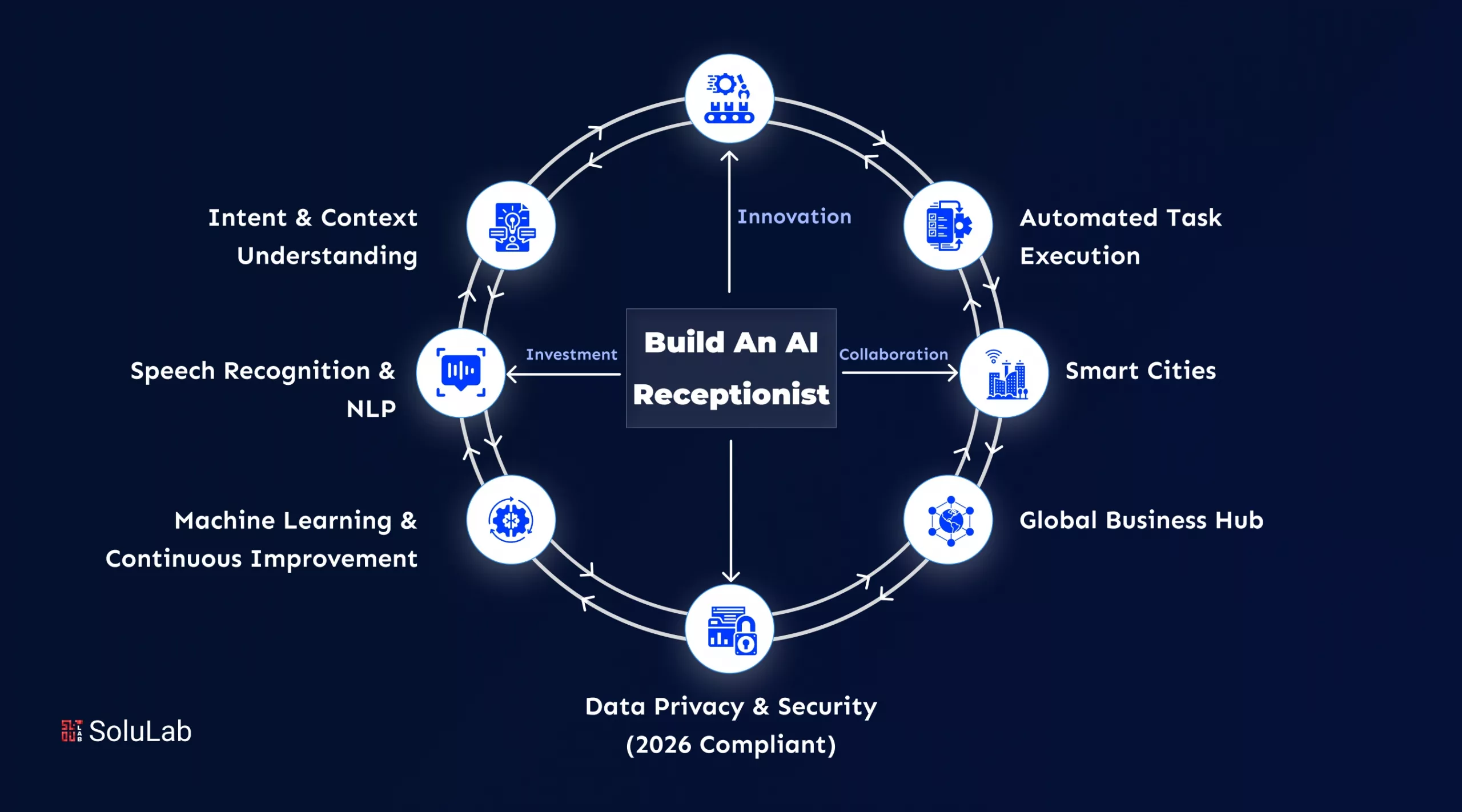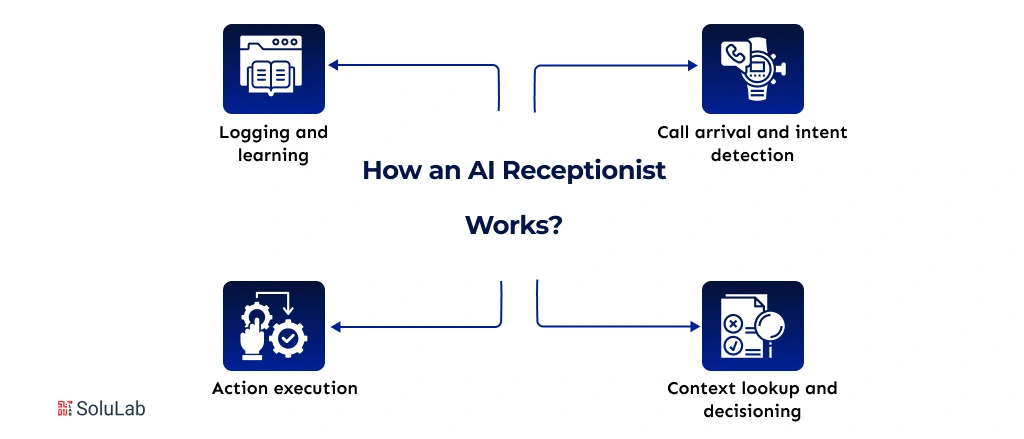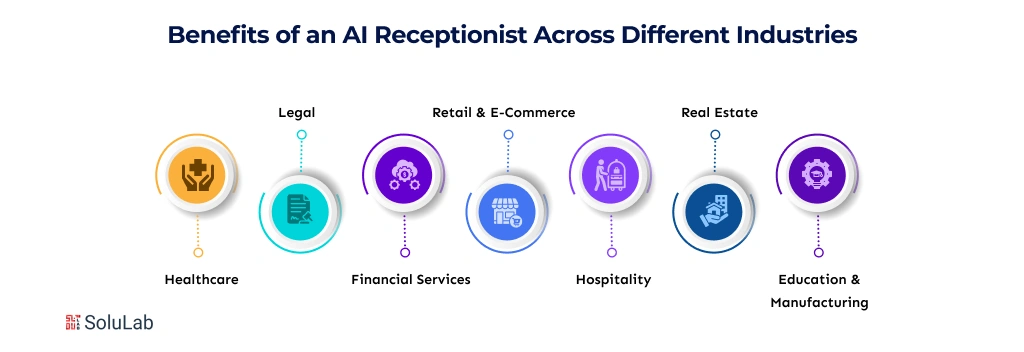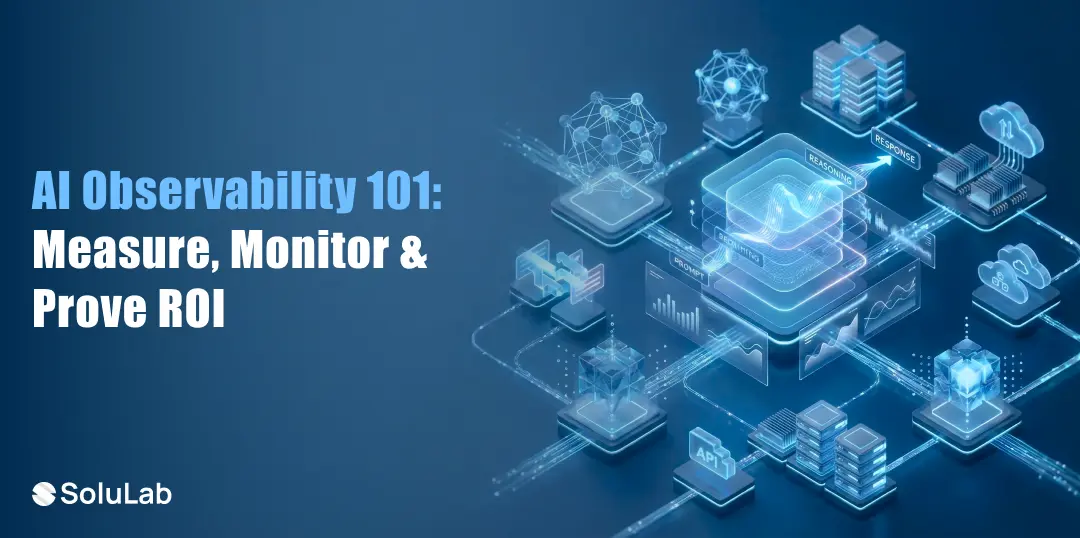
The world is running after new technology, and customers are not ready to waste hours or days solving their problems. They want instant service anytime, anywhere. If you are a startup, then it will be difficult to hire more people to answer clients or generate leads. If you are an MNC, then answering multiple calls at a time requires greater manpower. This is where an AI receptionist can act as a modern solution.
An AI receptionist helps people book appointments, answer FAQs, capture leads, and provide basic service to customers. It runs 24/7, works efficiently during peak hours, and keeps records in your CRM. From small to multi-national businesses using AI chatbots, receptionists to solve their customer problems and reduce expenses. In this blog, we will learn more about AI receptionists for business and how they help in multiple industries.
Why Do Modern Businesses Need an AI Receptionist?
Let’s assume you have several customers who have queries and technical issues with your product. You can’t go to everyone and clear their problems. That’s where a 24/7 virtual receptionist for field service can step in – answering every call, capturing key details, and passing only the important issues to your team. Some might be just simple things. For at least basic checks and to know the severity of the issue, you need to know about the customer’s problem.
To solve these AI receptionist development is a great choice. You know the market metrics show that in 2024 virtual receptionist projects hit $3.85 billion. And it’s expected that by 2033, it will grow to $9 billion. These AI receptionists increased efficiency across several industries. This is why you need an AI receptionist to assist your business.
Core Capabilities of an AI Receptionist
An AI-powered receptionist is more than just an automated answering system. It’s a smart, conversational assistant that takes over repetitive front-desk tasks and ensures every caller gets an instant, accurate response. Here’s what it can do:
-
Call Answering & Routing
Greets callers professionally, identifies their intent, and routes them to the right department, person, or voicemail, all without human intervention.
-
Appointment Scheduling
Checks calendar availability, books appointments, and sends confirmations in real time, ensuring seamless scheduling without double bookings.
-
FAQ Answering
Fetches accurate answers from your knowledge base or CRM to respond instantly to common questions about pricing, services, or timings.
-
Lead Capture & CRM Updating
Collects caller information, qualifies leads, and automatically updates your CRM with details of each interaction, saving your sales team valuable time.
-
Multi-Channel Handling
Manages conversations across multiple channels, phone, SMS, web chat, or even WhatsApp, ensuring consistent customer support everywhere.
-
Parallel Handling
Handles multiple calls or chats at once, ensuring no customer waits on hold, even during high-traffic hours or peak business seasons.
How an AI Receptionist Works?
An AI receptionist does many things, but from a business perspective, you need to know its workflow. So, that in the future, if any further AI integrations or updates are needed, you can understand the requirement and get it done. Let’s get to know it.

-
Call arrival and intent detection
First, speech-to-text captures the caller’s voice. Then, natural language understanding (NLU) detects intent, appointment, pricing question, or complaint.
-
Context lookup and decisioning
If the caller matched an existing contact, the system queries the CRM and personalizes responses. If not, the AI asks qualifying questions and records answers.
-
Action execution
Actions include booking a slot, sending a confirmation SMS or email, creating a lead in the CRM, or routing the call to a human with a summary of the interaction.
-
Logging and learning
Every call becomes training data. Transcripts feed ongoing optimization so the AI improves over time.
Technical bits: voice models (ASR/TTS), NLU engines, integration middleware (APIs, Zapier), and secure cloud hosting. Compliance layers manage call recording policies and data privacy (GDPR/CCPA).
Cost to Build or Deploy an AI Receptionist
AI receptionist development and deployment require an efficient team. So, before you approach AI development companies, check out the following steps.
Step 1: Understanding the goal and planning the strategy
The first step is defining what the AI receptionist should achieve. For example, will it handle all calls, just schedule appointments, or manage multilingual customers? During this stage, teams outline workflows, map integrations, and create the voice persona.
Typical time: 1-2 weeks
Approx. cost: $1,000 to $2,000
Step 2: Developing, integrating, and testing
Once the plan is ready, developers begin connecting the system to your phone line, calendar, and CRM. This includes setting up voice recognition, scheduling automation, and conversation flows that reflect your brand. Testing ensures it handles real-world calls naturally.
Typical time: 3-6 weeks
Approx. cost: $5,000 to $8,000
Step 3: Deployment and optimization
After testing, the AI receptionist moves to live deployment. It’s monitored for a few weeks while teams refine greetings, fix routing issues, and adjust to caller behavior. Monthly updates and analytics reviews keep it accurate and consistent.
Typical time: 1-2 weeks
Approx. cost: $500 to $1,500 (initial setup), plus small recurring fees for hosting and maintenance.
Final Estimate and Timeline
- For a small-to-medium business, a complete AI receptionist setup costs around $10,000 to $12,000 and takes about 6–8 weeks from planning to launch.
- Enterprise deployments or highly customized builds with multi-language and CRM automation can extend to $25,000–$40,000.
Hence, partnering with an experienced AI development company can cut the costs and also give you the best model.
Key Benefits of an AI Receptionist Across Different Industries
AI use cases across multiple industries are proving valuable, each gaining unique benefits based on workflows and customer interaction needs. Below are some of the most notable use cases and adoption results, showing how automation is delivering real impact without repeating earlier points: 
1. Healthcare: AI receptionists handle appointment scheduling, prescription refills, and insurance triage efficiently. Clinics and hospitals have reported up to a 30% boost in administrative efficiency, with nearly 70% of routine calls resolved by AI for healthcare when properly configured, eventually freeing staff for more critical tasks.
2. Legal: For law firms, AI assistants streamline client intake, appointment booking, and case-related follow-ups. With growing pressure to improve billable-hour productivity, AI adoption in legal firms reached 79% in 2024, making it one of the fastest-growing automation sectors.
3. Financial Services: Banks and financial institutions use AI receptionists for account inquiries, fraud alerts, and customer verification. Some markets have achieved up to 75% AI-driven automation across their customer operations, improving both security and response time.
4. Retail & E-Commerce: Retailers deploy AI receptionists for order tracking, returns, and stock availability queries. With the global retail AI market projected to hit multi-billion-dollar growth by 2026, customer support automation has become a key driver of faster resolutions and higher customer satisfaction.
5. Hospitality: Hotels and travel companies use AI receptionists for reservations, guest queries, and concierge requests. The industry is seeing over 30% annual growth in voice-AI applications, helping deliver faster responses and personalized guest experiences around the clock.
6. Real Estate: Property firms rely on AI receptionists to qualify leads, manage inquiries, and schedule viewings. This automation has cut down manual labor hours, reduced missed calls, and significantly improved response times for potential buyers and tenants.
7. Education & Manufacturing: Educational institutions and manufacturers use AI receptionists for admission queries, supplier communication, and delivery scheduling. Both sectors report notable time and cost savings, especially in managing repetitive administrative tasks.
Across all industries, the results are clear: fewer missed calls, faster booking rates, and measurable ROI, ultimately proving that AI receptionists are not just a trend but a long-term business enabler.
Remarkable AI Receptionists and Emerging Players in 2025
There are several AI receptionists that are performing remarkably well; however, the following three are taking the top places. Let’s check them out.
1. Podium is a strong lead management and an “AI Employee” that guarantees round-the-clock engagement; good for SMBs focused on faster lead response and conversion.
2. ALICE Receptionist mixes AI with video avatars for lobby automation and kiosk-based guest check-in; ideal for hospitality and property management that want on-site automation.
3. My AI Front Desk simple, appointment-first AI phone receptionist offering quick setup and testing options; great for clinics and small practices wanting a fast pilot.
4. Welco.ai specializes in appointment-based service businesses with industry-specific optimization for dental practices, home services, and medical clinics. Built on proven voice AI technology, it prioritizes reliable service account integrations and offers same-day deployment; perfect for businesses losing revenue to missed calls who need an immediate solution.
Each platform targets different industrial goals and company requirements, so discuss your idea and requirements with any top AI consulting company and choose the best model for your business.
The Future of AI Receptionists
As the technology emerges into new phases, the adoptions, integrations, and AI innovations come into the picture. The current model of AI receptionists might change into a more full-fledged form. Let’s some futuristic ideas that are swirling in AI growth.
- Emotion-aware routing: Detect frustration and escalate to humans automatically.
- Hyper-personalization: Pull real-time CRM cues to tailor responses per caller.
- Agent ensemble: Multiple AI “staff” with different personas for sales, support, and billing.
- Autonomous workflows: AI triggers multi-step automations (book → invoice → follow-up) without human handoff.
Conclusion
Through his blog, you might have understood the need for an AI receptionist and why it’s getting popular. If you are also thinking of having an AI assistant, then set your goal or be ready to discuss your requirements with AI development companies like SoluLab.
We, at SoluLab, help businesses to develop, integrate AI solutions, and maintain sustainable growth. Our expert team designed an AI-powered ChatGPT that provides users with seamless communication and enhanced engagement for travel recommendations.
If you are also looking for AI integration solutions, then contact us today and get started!
FAQs
1. How does an AI receptionist bring out-of-the-box innovation for businesses?
An AI receptionist goes beyond basic call handling. It automates voice, chat, and lead capture while learning from interactions, offering creative, scalable solutions that redefine modern customer communication.
2. Can AI receptionists handle complex customer conversations?
Yes, advanced AI receptionists use NLP and voice understanding to detect intent, manage multiple queries, and escalate complex cases to human agents while keeping context intact for seamless communication.
3. How much does it cost to build an AI receptionist for small businesses?
Typically, AI receptionist development costs between $10,000 – $12,000+ for small-to-medium businesses, covering strategy, integrations, and deployment. The ROI appears within months due to efficiency and 24/7 service coverage.
4. Which industries benefit most from AI receptionist adoption?
Industries like healthcare, real estate, legal, retail, and hospitality gain the most. AI receptionists manage bookings, FAQs, and client intake, helping businesses save time, reduce costs, and enhance customer experience.
5. How can I get started with SoluLab’s AI development solutions?
It’s very simple to get in touch with us. Just click the link and give your details, and can discuss your business requirements with our SoluLab’s AI experts.






